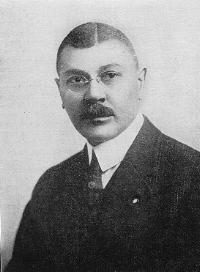

Mr. Jefferson is a native of the sister state of Ohio, having been born at Pomeroy, Ohio, on January 27, 1869. His father, William Henry Harrison Jefferson, was a fireman at the local salt furnace, and passed away when his son was in his teens. The mother of our subject was, before her marriage, Almeda Starks, whose father, Joseph Starks, a Baptist preacher, came to Pomeroy during Lightburn's retreat in 1862.
Growing up in Pomeroy, young Jefferson attended the local public and high school and academy, completing his work in the latter in 1888. Up to this time his schooling had been attended by no unusual difficulties, but he says, "My father died just after I graduated from Academy and I had to begin teaching district school to support my mother. My education afterwards has been therefore by extensive courses, summer schools and in the 'university of hard knocks.'" This work was done through Ohio University and Marietta College. In recognition of his work and attainments, Morgan College of Baltimore, conferred on him the degree of Master of Arts. Beginning his work as a teacher early, he has a record in point of service, surpassed by few men of the race in the state. He began teaching at St. Albans in Kanawha County, in the fall of 1888 and taught that school for five years. Such was the character of his work there that he was made principal of the Summer High School at Parkersburg, to which he came in September, 1893. New honors came to him in 1902, when he was appointed Recording Clerk in the Secretary of State's Office at Charleston, serving from July 1, 1902 to March, 1905. On the expiration of his term, he returned to the principalship which he had resigned at Parkersburg, which position he still holds (1922). His position as an educator may be inferred from the fact that he was for eight years a member of the Board of Regents of State schools and is on the Board of Directors of the Teachers' Association of Northern W. Va., of which he was at one time President. In politics he is a Republican and has long been active in the councils of the party, and has been in demand for campaign work. He belongs to the M. E. church, in which he has been active since childhood. He is treasurer of his local church. He is also prominent in the work of the secret orders and benevolent societies. In the Pythians he is Supreme Representative and a member of the Board of Directors of the Pythian Mutual Investment Association. He belongs to the Masons and the court of Calanthe, being Grand Worthy Counsellor in the latter. He is also president of the Parkersburg branch of the N. A. A. C. P. and is a member of the "Phi" chapter (Ohio University), Alpha Phi Alpha. Greek letter fraternity. On July 21, 1898, Prof. Jefferson married Miss Clara Thomas, daughter of Matthew and Minerva Thomas of Parkersburg. She was a teacher in the Parkersburg schools. They have two children, Harry Rupert and Miles Matthew Jefferson.
Looking back over his struggles, Prof. Jefferson is of the opinion that the greatest factor in his success was the fact that early in life he was led to Christ and was thrown on his own resources in which situation he was sustained by the happy, helpful influence of his mother and wife. Mr. Jefferson has observed and studied conditions intelligently and is of the opinion that progress may best be promoted "By the fullest organization and cooperation possible, together with Christian education, largely disseminated among the masses, and the accumulation of wealth." His favorite reading consists of the Bible and such standard literature as Shakespeare and biography and books along the line of his work.